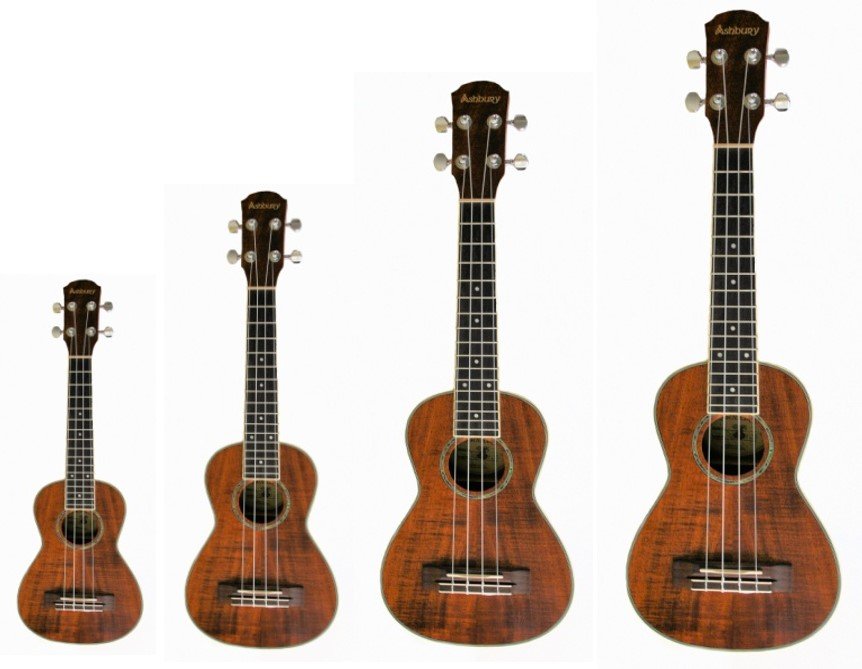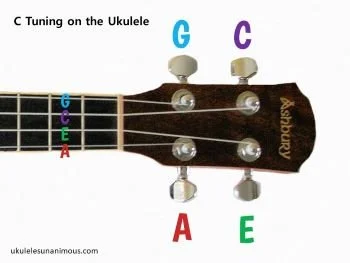Improve Your Sound With Alternative Ukulele Tunings
Standard Tuning
Although the standard ukulele tuning of C (G-C-E-A) is the most common tuning today, it has not always been the case. In the first half of the 20th century the most common tuning was probably D (A-D-F#-B). So, although there’s nothing wrong with C tuning for ukuleles, let’s be bold and try something different!
Different Types of Uke Tunings
First, don’t be worried about trying out alternate tunings, they are easily achieved with the use of any electronic tuner (it may well need to be in ‘Chromatic’ mode) and if you know your chord shapes for GCEA tuning, they stay the same.
C Tuning (G-C-E-A)
Ukulele strings are normally tuned to the notes G on the 4th string, C on the 3rd string, E on the 2nd string and A on the 1st string.
This is called the key of C and is good for mid-range vocals. G-C-E-A tuning is also a handy key to use if you are playing alongside a piano or guitar.
D Tuning (A-D-F#-B)
When your ukulele is tuned to the key of D, all you are doing is putting a bit more tension into the strings compared to C tuning so that the sound becomes brighter. Some performers prefer to use D tuning on the stage because it packs more of a punch, and in the same way, some banjolele players like to use the key of D as they prefer the sound and string tension.
D tuned ukuleles also partner well with baritone ukuleles because of the beautiful low D note on a standard tuned baritone.
Word of warning - take your time tuning up from G-C-E-A to A-D-F#-B, gradually increasing the tension on the strings rather than trying to achieve D tuning in one go. If you are ever in any doubt as to whether your strings and/or instrument will accommodate a particular tuning, be sure to consult with a reputable music store or the manufacturers.
Baritone Ukuleles
Suggested tunings on this page are for soprano, concert and tenor ukuleles. Standard tuning for Baritone ukuleles is different - DGBE which is the same as the highest four open notes on a guitar. However, this tuning is not recommended for other ukuleles. You could perhaps get away with it on a tenor, but the strings would be quite slack. Again, make sure you seek advice and use the correct strings to match the tension.
Bb Tuning (F-Bb-D-G)
This time you are simply taking a little bit of tension out of the strings so that the sound is more mellow than the standard C tuning. We particularly like Bb tuning when playing chord arpeggios and it also makes playing barre chords on the first couple of frets much easier. We always keep some ukuleles tuned to Bb because it suits our voices better and makes playing along with trumpets much easier!
A Tuning (E-A-C#-F#)
This is another nice lower alternative to C tuning and a step above the D-G-B-E tuning of the standard baritone. For this reason, strings tuned to E-A-C#-F# are particularly suited to the tenor ukulele. Give it a go!
There are many other more exotic tunings that you could research further, but for now, have a play around with some of the tunings we have suggested. You never know, you might find one that is better suited to either your voice, your instrument, or your performance. Remember, the beauty of these tunings is that they are the same, but just in different keys, either a bit higher or lower in pitch. This means that, as long the relationship between the strings is kept the same, the chord shapes themselves also stay the same.
Happy strumming 😊
Find more expert tips and practice techniques with our useful guides.



